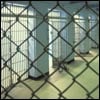A few weeks ago, BBC News reported on a group of unexpected death penalty advocates. Apparently, hundreds of prisoners serving life sentences in Italy have called on President Giorgio Napolitano to bring back the death penalty.
Italy has actually been at the forefront of the fight against capital punishment and recently lobbied the UN Security Council to table a moratorium on the practice. But at home, some of the country's longest serving prisoners
Musumeci said he was tired of dying a little bit every day
want the death penalty re-introduced. The letter they sent to President Napolitano was written by a convicted mobster, Carmelo Musumeci, and co-signed by 310 of his fellow lifers. Musumeci, 52, who has been in prison for seventeen years, said he was tired of dying a little bit every day. We want to die just once, he said, and "we are asking for our life sentence to be changed to a death sentence"
It was a candid letter written by a man who, from within his cell, has tried hard to change his life. He has passed his high school exams and now has a degree in law. But his sentence, he says, has transformed the light into shadows.
Prison in Torah Law
Mr. Musumeci has a point. The argument he employs is the reason why incarceration is not part of the Torah's penal code. Depending on the nature of the crime, a person received a fine (compensative and/or punitive damages) or corporal punishment. In extreme cases, capital punishment was called for. As is the case with all Torah-sanctioned punishments, the person's death wasn't intended to exact vengeance, and while it's function as a deterrent is referred too, neither was this its ultimate purpose. Rather, the person's death brought atonement for the sin he committed, and — in conjunction with teshuvah (repentance) — guaranteed the soul's rehabilitation.
A person must be allowed to be productive in the fullest sense The courts were not empowered, however, to rob a person of the ability to be a full-fledged productive member of society. A person who does not deserve to die must be allowed to be productive in the fullest sense, a prospect which is impossible when confined in prison.1
Indeed, it can conceivably be argued that long term incarceration violates the Eighth Amendment of the Constitution which prohibits "cruel and unusual punishment." Is robbing an individual of the most basic human desire/need—freedom—less cruel than inflicting physical pain? I believe that any prison inmate will answer that question in a nanosecond.
While this is an issue which societies and legislatures must consider, let us for a moment consider the prison inmate's perspective. From Mr. Musumeci's point of view, whether the court's decision was prudent or not is seemingly moot. Rightly or wrongly, the fact is that he is serving a life sentence. What should his attitude be now? Is he right for seeking a death sentence?
In Our Own Lives
To a lesser degree, we can all relate to this predicament.
We are all human, and we all make mistakes. And we pay for these mistakes, sometimes quite dearly. One person partied away his college years and now doesn't have a degree. Another person made irresponsible financial decisions and now she is saddled with a poor credit rating. As the common adage goes, "You make your bed, so now you must lie in it." What attitude does G‑d expect us to have towards our mis-made beds? Are we simply to resign ourselves to our fate, justifying the misery because we "earned it"?
Here chassidic teaching makes an important distinction between the attitude we should assume before taking a certain action, and how we should view our situation after the fact. Before exercising our free choice to act in a certain way, we must appreciate that we are fully responsible for our actions and their consequences. But after we find ourselves in a certain situation, we must realize that everything is by Divine providence. The fact that we are in a certain place—regardless of why or how we got there—means that we have a Divinely ordained role to fill in that very place, under those very circumstances.
A powerful precedent for this approach to life can be found in one of the most fateful blunders in Jewish history, some 3,300 years ago. There was a time when an entire nation sinned, and was condemned to a lifetime of seemingly futile existence. Yet the ultimate significance of this "unproductive" period was that it served as a meaningful, indeed critical phase in our development as a people.
The Events
The Children of Israel were in the desert, headed for the Holy Land. But the scouts they dispatched to Canaan to reconnoiter the land returned with an ominous report. They asserted that the Land was unconquerable due to its fortifications and immensely powerful inhabitants. Instead of demonstrating faith in G‑d, the Israelites panicked: "Why is G‑d bringing us to this land to fall by the sword; our wives and children will be as spoils.... "2
And G‑d agreed. "As you have spoken in My ears, so will I do to you." The generation that was too fearful to enter the Land would never merit to cross the Jordan River and inherit the Land of Milk and Honey. They would meander about the Sinai Desert for forty years, and only after they all died out, would their children enter the Land.
The entire generation was handed a life sentence The entire generation was handed a life sentence. This was the bed they made for themselves; now they had to lie in it. For good. The day this decree was handed down—the Ninth of Av—became the most tragic day on the Jewish calendar, and the scene of many more troubles and misfortunes throughout our history.
And yet, despite the negative circumstance that brought it about, this forty-year period was, in a certain sense, the most glorious period in Jewish history. It was during these forty years that G‑d communicated the Torah to Moses, and the people of Israel imbibed the Divine wisdom at the feet of the greatest teacher of all time. It was a time of unfettered spirituality, when we were nourished by the ethereal "bread from heaven" and protected and pampered by celestial "clouds of glory," creating the ideal conditions in which to grow spiritually and fortify ourselves for the challenges to come.
A Cosmic Shabbat
True, our entry into the Holy Land was put on hold. As lofty as it may seem, sitting in a desert and studying Torah all day ensconced in miraculous heavenly clouds is not the reason why G‑d dispatched pure souls into this physical world. Instead, G‑d wanted us to enter Canaan and work the land. He wants us to become involved with a world which challenges the soul's resolve and commitment to G‑d, and through the observance of the mitzvot to imbue this physical world and everything within it with holiness and divine purpose.
And yet, once a week we observe the Shabbat—a day when no work is allowed, a day which is dedicated to spirituality, Torah study and prayer. From this day we take the strength and fortitude to successfully prevail against a hostile environment during the following six days. So although the Shabbat is "merely" a preparation for the following week, it is a mitzvah of utmost importance, considered the equivalent of all the other mitzvot combined.
Those forty "futile" years in the Sinai Desert, say the chassidic masters, became the cosmic Shabbat of Jewish history, setting the spiritual foundation for all future generations.
The same applies to each and every one of us. When a person finds himself in undesirable circumstances as a result of his own foolish actions, ultimately he is there because G‑d wants him to be there; because currently this is exactly where he must be in order to accomplish his unique mission in life.








I have met several people convicted of murder. One, a man on death row, was fighting to have his death sentence overturned in favour of life without parole. When I told another of this, a man serving a 34 year sentence, he said he would prefer to be executed than spend the rest of his life in prison.
So I do not know which is worse..